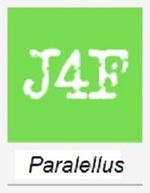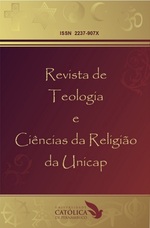GOD BEYOND ESSENCE
ETHICS AND TRANSCENDENCE IN LÉVINAS
DOI:
https://doi.org/10.25247/paralellus.2021.v12n31.p585-600Keywords:
God, Ethics, Lévinas, Face.Abstract
This article aims to present the approach of philosopher Emmanuel Lévinas on the matter of God and the possibility of its narrative. It is a perspective developed from a scathing criticism of onto-theo-logy, which, according to the philosopher, reduced God to an object among others, suppressing its alterity, restricting it to the structures of the Same and situating it in immanence. Far from the scenario of ontology and claims to prove the existence of God, Lévinas seeks the circumstances in which this exceptional name can be uttered as a significant word. The coming of God to mind relates to the ethical field, because, in the Levinasian thought, the relation with the Infinite is related to both the ethical plot and social justice, having the other man's face as its main reference. The word of God reveals itself as a trace in the face, as a trait refractary to the apprehension through the determinative concept, or rigid discursive characterizations. By announcing the beyond being, or the otherwise than being of the Infinite, Lévinas distinguishes between two linguistic structures, differentiating the pre-originating Saying, related to the ethical sphere, and the Said, of ontological matrix. For Lévinas, the immemorial Saying carries the trace of the Infinite. Therefore, the Said of the narrative about God must move in constant self-corrective evolution, having as its scope, the significance of the word God contained in the Saying of ethics, beyond the reach of thematization.
Downloads
References
BAUMAN, Zygmunt. Ética pós-moderna. São Paulo: Paulus, 1997.
CAMPOS, Fabiano Victor de O. A teo-lógica de Levinas face às teologias racional e negativa. In: CAMPOS, Fabiano; SENRA, Flávio; LOTT, Henrique; ALMEIDA, Tatiane (orgs.). Religião e contemporaneidade: atualidade do fenômeno religioso. São Paulo: Fonte editorial, 2017. p. 159-191.
CAMPOS, Fabiano Victor. De outro modo que ser: o Deus de Emmanuel Levinas. In: CHACON, Daniel Ribeiro de Almeida; ALMEIDA, Frederico Soares de. (orgs.). Filosofia da religião: problemas da Antiguidade aos tempos atuais. São Paulo: Edições Loyola, 2020. p. 171-198.
CAMPOS, Fabiano Victor. Levinas e a teologia. Horizonte, Belo Horizonte, v. 14, n. 44, p. 1460-1494, 29 dez. 2016a.
CAMPOS, Fabiano Victor. O Deus 'outramente que ser' de Emmanuel Levinas. Horizonte, Belo Horizonte, v. 17, n. 53, p. 1249-1282, 2019.
CAMPOS, Fabiano Victor de O. O ser e o outro do ser: a questão de Deus em Emmanuel Levinas. Tese (Doutorado em Ciência da Religião) – Universidade Federal de Juiz de Fora, Juiz de Fora, 2016b.
CHALIER, Catherine. Lévinas: a utopia do humano. Lisboa: Instituto Piaget, 1993.
DERRIDA, Jacques. L’écriture et la différence. Paris: Éditions Du Seuil, 1967.
DESCARTES, René. Meditações sobre filosofia primeira. Campinas: UNICAMP, 2004.
FAESSLER, Marc. Dieu, autrement. In: CHALIER, Catherine; ABENSOUR, Miguel et al. (Org.). Lévinas. Les Cahiers de l’Herne Paris: L’Herne, 2006, p. 411-420.
HUNEMAN, Philippe; KULICH, Estelle. Introduction à la phénoménologie. Paris : Armand Colin, 1997.
LÉVINAS, Emmanuel. Autrement qu’être ou au-delà de l’essence. Paris: Kluwer Academic, 2006. (Le livre de poche)
LÉVINAS, Emmanuel. De l’existence à l’existant. Paris : Vrin, 2004a.
LÉVINAS, Emmanuel. De Dieu qui vient à l’idée. 2ª ed., Paris, Vrin, 2004b.
LÉVINAS, Emmanuel. De l’évasion. Paris : Fata Morgana, 1982a. (Le livre de poche).
LÉVINAS, Emmanuel. Dieu, la mort et le temps. Paris : Grasset & fasquelle, 1993.
LEVINAS, Emmanuel. En découvrant l’existence avec Husserl et Heidegger. Paris: Vrin, 2010.
LÉVINAS, Emmanuel. Entre nous: essais sur le penser-à-l’autre. Paris : Grasset, 1991. (Le livre de poche).
LÉVINAS, Emmanuel. Éthique et infini: dialogues avec Philippe Nemo. Paris: Fayard, 1982b. (Le livre de poche).
LÉVINAS, Emmanuel. Humanisme de l’autre homme. Paris : Fata Morgana, 1972. (Le livre de poche).
LÉVINAS, Emmanuel. Les imprévus de l’histoire. Paris: Fata Morgana, 1994a. (Le livre de poche).
LÉVINAS, Emmanuel. Liberté et commandement. Paris: Fata Morgana, 1994b. (Le livre de poche).
LÉVINAS, Emmanuel. Le temps et l’autre. Paris: PUF, 2009.
LÉVINAS, Emmanuel. Totalité et infini: essai sur l’extériorité. Paris : Kluver Academic, 2014. (Le livre de poche).
LÉVINAS, Emmanuel. Transcendance et intelligibilité. Genève : Labor et Fides, 1996.
MENEZES, Magali Mendes de. Nos vestígios de um pensamento ou por uma alteridade da palavra. In: SUSIN, Luiz Carlos et al (Org.) . Éticas em diálogo: Levinas e o pensamento contemporâneo: questões e interfaces. Porto Alegre: EDIPUCRS, 2003, p. 131 a 144.
MOLINARO, Aniceto. Metafísica: curso sistemático. São Paulo: Paulus, 2002.
MORO, Ulpiano Vásquez. El discurso sobre Dios en la obra de E. Levinas. Madri: Publicaciones de la Universidad Pontifícia Comilas, 1982.
PIVATTO, Perventino Stefano. A questão de Deus no pensamento de Lévinas. In: OLIVEIRA, Manfredo; ALMEIDA Custódio et al. (Org). O Deus dos filósofos contemporâneos. Petrópolis: Vozes, 2002, p.178-198.
RIBEIRO JUNIOR, Nilo. Sabedoria da paz: ética e Téo-lógica em Emmanuel Levinas. São Paulo: Loyola, 2008.
SOUZA, José Tadeu Batista de. Deus, Ética e Ontologia em Levinas. Ágora Filosófica, Recife, v. 20, n. 2, p. 115-131, 2020.
Downloads
Published
Issue
Section
License
Copyright (c) 2021 Fabiano Victor Oliveira Campos, Luis Fernando Pires Dias

This work is licensed under a Creative Commons Attribution 4.0 International License.
A submissão de originais para a Paralellus implica a transferência, pelos autores, dos direitos de publicação eletrônica. Os direitos autorais para os artigos veiculados neste periódico são do autor; todavia, são da revista os direitos sobre a primeira publicação. Os autores somente poderão fazer uso dos mesmos resultados em outras publicações se indicarem, claramente, que a Paralellus foi o meio originalmente utilizado. Em decorrência do fato de ser a Paralellus uma revista de acesso público, é permitida a utilização gratuita dos artigos em aplicações educacionais e/ou científicas não comerciais, desde que respeitando-se a exigência de citação da fonte (Texto atualizado em 16-11-2020).
















